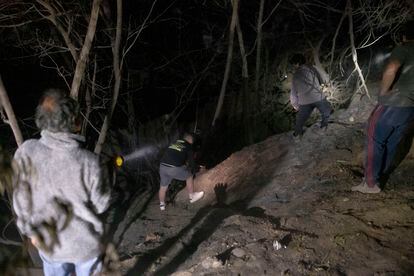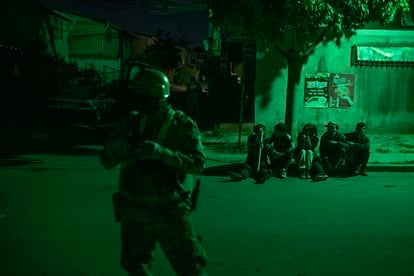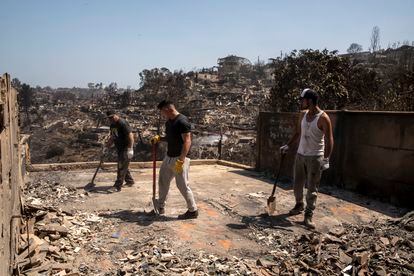At the top of a Viñamarino hill stands the Olivar Alto: a working class population that saw its memories disappear completely in the flames. In one of the areas most affected by the fires in south-central Chile, only the skeletons of its semi-detached houses, a pile of rubble and the desperation of its people remain. In particular, those on Chumisa Street. They lost at least six neighbors – of the 123 fatalities – most of their pets and, according to those consulted for this report, no authority has come forward to offer them help four days after the tragedy. Their anguish grows at night due to the threat of new intentional fires or looting. “They want to steal our ashes,” laments Josefa Cornejo, 19, with her face and body covered in soot.
The last night they organized themselves to take surveillance shifts. Gallons of gas and copper cables had been stolen from some, and it was already news that there were people setting fires in the area, although no arrests have been made. Nicole Martínez, 30 years old and mother of two, was one of the four volunteers to stand guard. They saw, according to her story, an intruder trying to light the flames in one of the few trees that remain standing on a visibly impacted hill. Theories about who he was are many. The more desperate the neighbor, the more serious the accusation. The only consensus that exists among the inhabitants of Olivar Alto is that they want the police and the military to come at night to protect them. That they already have enough. That they need them. Regarding material aid, they claim that it only reaches the lower part of the hill.
“Neighbor, do you want me to paint your house number?” asks a young woman with a jar of paint. “It is so that when they come to do the cadastre they know who owns the house.” They are waiting for you.

Lucy Castañeda, a 61-year-old widow, removes the debris from the home where she lived for the last 33 years with a shovel. The place where her son was born, where she lost her husband and where she fulfilled her dream of her own house. She is helped by her family and neighbors in her arduous task. Everyone knows each other. Castañeda has an 80-year-old aunt in charge of her who forces her to go back and forth to the disaster area. Her family managed to get out with the fire on their backs and burning ashes falling from the sky, she describes. She took out her granddaughter and her son took out her aunt. “It is as if a nuclear bomb had fallen and destroyed us all. So many neighbors died… we are alive, but we have nothing. Nothing. Not even my documents,” says Castañeda from what was the patio of her house, today a cement cube.
The majority of those interviewed moved to a family member's house after the emergency. There are others who sleep as best they can to take care of the only thing they have. “My son comes to stand guard because at night this becomes a no-man's land. Last night they came to set fire again, suddenly they started shooting,” he laments. The only thing that is urgent is for the authorities to come and remove the rubble that is gathering outside the charred houses, in the middle of the street, emanating a smell of decomposition and giving the sensation of a war zone.

Elizabeth Cabezas, a 47-year-old secretary, also hopes that specialists will be sent to evaluate whether it is possible to rebuild on what is left of her house or whether it must be torn down completely. She had lived there since 1988, when the first properties of the government project of the Housing and Urban Planning Service of Chile were delivered. The fire caught her on vacation and a friend gave her the warning: “Your house didn't disappear, your street disappeared,” she told her. She lists all the neighbors she lost, most of them elderly who fell by the wayside during the evacuation. Several managed to get into their cars to escape, but in a territory of narrow roads, a bottleneck was created from which not everyone could get out.
Carla Victoriano, 41, an employee at a customs agency, has her one-and-a-half-year-old little boy sleeping inside what little remains of her house. She has nowhere to leave him while she cleans her property. The main help she received was from members of the Santiago Wanderers soccer team, who came to the area as volunteers. The image of young people with shovels, rakes and bags walking from the road to the top of the hills is a recurring image these days in Viña del Mar. The neighbors
insist that it has been them and not the authorities who have assisted them the most. But when night comes they leave. And those affected, they claim, are left alone.

Subscribe here to the EL PAÍS Chile newsletter and receive all the key information on current events in the country.
#epicenter #catastrophe #Chile #nuclear #bomb #fallen #alive